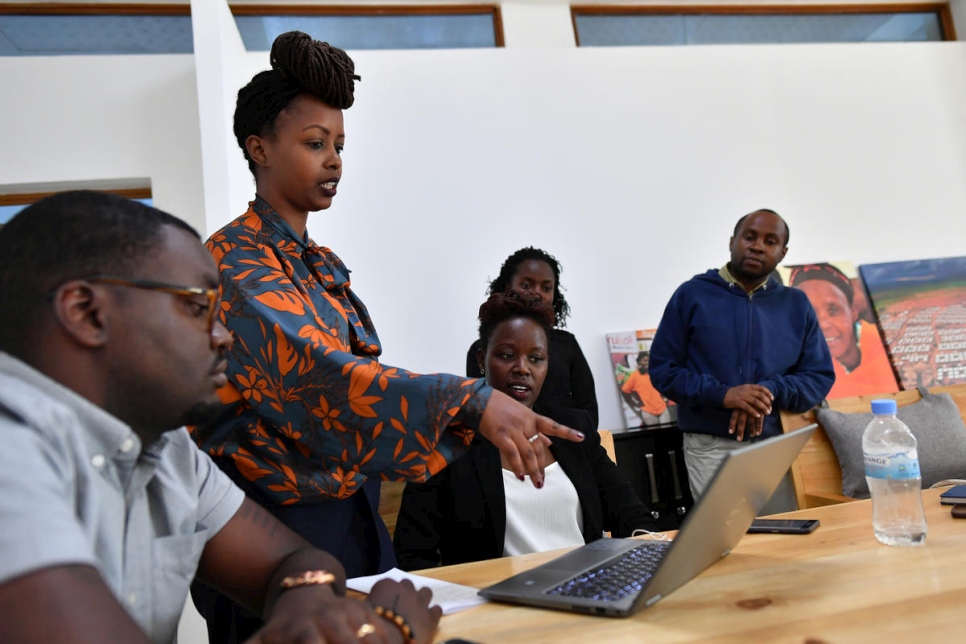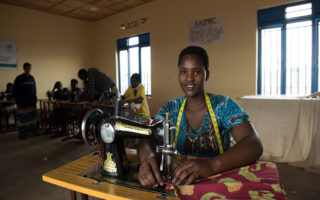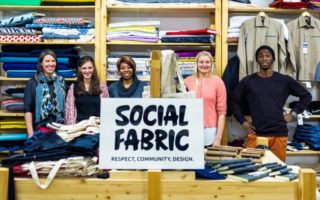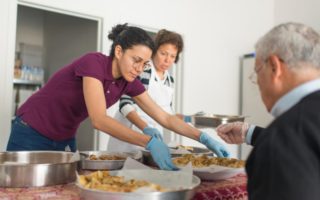Support scheme in Rwandan capital and elsewhere sees refugee businesses including Burundian-owned LPG store create 2,600 new jobs countrywide.
By Catherine Wachiaya in Kigali, Rwanda
At a busy intersection in downtown Kigali, Annick Iriwacu is meticulously going through her shop’s inventory. The Burundian refugee runs a small liquid petroleum gas (LPG) distribution store with her younger brother. Business is booming now, but things were not so rosy when she first arrived in the Rwandan capital three years ago.
“Coming here was not easy because when you reach a place you are not familiar with, you can face a lot of difficulties,” says the 33-year-old mother of three.
In 2015, Annick fled unrest in her country with her husband and children, finding refuge in Kigali, which has been described as Africa’s cleanest and greenest city. Used to being financially independent back home, she quickly sought out ways of earning a living.
Inspired by Kigali’s reputation for cleanliness and the country’s switch to clean energy, Annick decided to start selling LPG. “I thought about it and I realized the vision of Rwanda and how it is clean,” she explains. “So I decided to go into gas. It required a lot of capital but I decided to try.”
A cousin referred her to Inkomoko – a local business consulting firm that works with UNHCR, the UN Refugee Agency, to train and support refugee entrepreneurs.
“They gave me strength and hope to continue, because I was giving up.”
“They gave me strength and hope to continue, because I was giving up,” says Annick.
She got guidance from Inkomoko on how to register her business, pay taxes and manage her shop. She registered with the Rwanda Development Board and received a till number that enables her to pay taxes. She has grown the business and now employs five people.
Lydia Irambona, the Director of Inkomoko’s Refugee Program, says their approach is designed to help refugees like Annick build their businesses on solid foundations. “Our main goal is to help them increase their revenue, get more customers and understand how to do business here,” she explains.
As well as helping refugees become financially independent, the scheme has also resulted in a small but significant boost to the local economy. The programme began in 2016 and has worked with 3,300 refugees. In 2017, they trained 809 refugee entrepreneurs in cities and in camps, resulting in the creation of 2600 new jobs countrywide.
“We have seen a lot of difference in terms of confidence, feeling like they are living a dignified life and also the fact that they have been able to create jobs,” Irambona says.

Lydia Irambona (second from left), gives business training to refugees in Kigali, Rwanda. © UNHCR/Anthony Karumba
Strategic partnerships with UNHCR and private sector companies like Inkomoko have shown their worth, and Irambona sees scope for more private sector companies in the city to support refugees, calling it a “win-win” situation for all. “Refugees come into the country with knowledge, skills and a different culture which could be of added value,” she says.
As of October 2018, the country hosted more than 150,000 refugees, the majority of whom (79 per cent) live in six camps across the country, while the rest live in urban areas. There are about 13,000 registered refugees in major urban centres such as Kigali and Huye.
Around 60 per cent of the world’s 25.4 million refugees live not in camps but in cities and urban areas across the Americas, Europe, the Middle East, Africa and Asia. Mayors, local authorities, social enterprises and citizen groups are on the frontlines of the global refugee response, fostering social cohesion and protecting and assisting the forcibly displaced men, women and children in their midst.
Kigali is part of a growing global network of municipalities that are opting to embrace refugees and the opportunities they bring. From Sao Paulo to Vienna, these Cities of Light are giving hope to the world’s most vulnerable by offering sanctuary and the chance to become part of the social fabric.
In December, UN High Commissioner for Refugees Filippo Grandi hosted the 11th High Commissioner’s Dialogue event in Geneva, this year focusing on the role of cities in protecting the urban displaced.
The Government of Rwanda, via its Ministry in charge of Emergency Management (MINEMA), is promoting refugee integration in urban areas in various ways.
“The Government of Rwanda is very keen to continue supporting refugees through targeted assistance which includes their socio-economic inclusion,” explains Veneranda Ingabire, Senior Manager of the Special Projects Unit in MINEMA.
“The advantage of being in a city is that you have the opportunity to work.”
Such assistance is in line with the four commitments that Rwandan President Paul Kagame made during the 2016 Leader’s Summit on Refugees, and the comprehensive and inclusive approach formally adopted by the Government of Rwanda in February 2018, she adds.
The government’s strategy includes practical actions such as the issuance of national refugee identity cards to all verified refugees, conventional machine-readable travel documents, promotion of livelihood assistance, and access to health insurance and the national education systems.
“We are very proud to help our brothers and sisters from the DRC and Burundi, as many of us have been refugees not so long ago,” Ingabire says. “We will remain open to identifying solutions which will help them improve their wellbeing in Rwanda.”
For Annick, the support she has received has enabled her to provide for herself and take care of her family, and helped her to feel part of her adopted city.
“The advantage of being in a city is that you have the opportunity to work,” she says. “You can find opportunities, you can use your hands and market your business.”
See more stories from the Cities of Light series
Originally published by UNHCR on 27, December 2018





